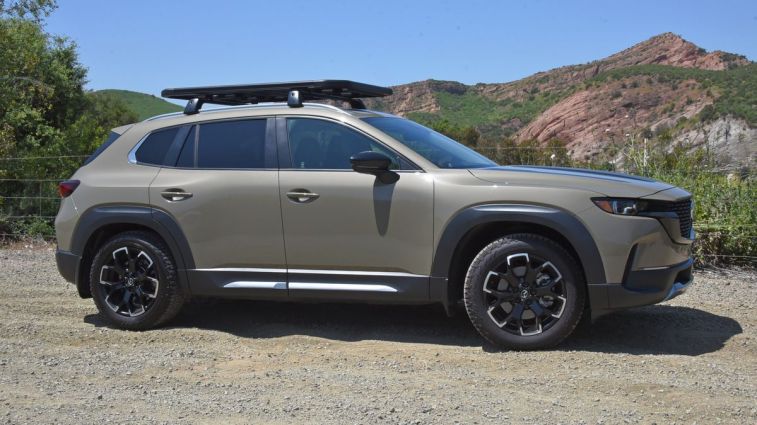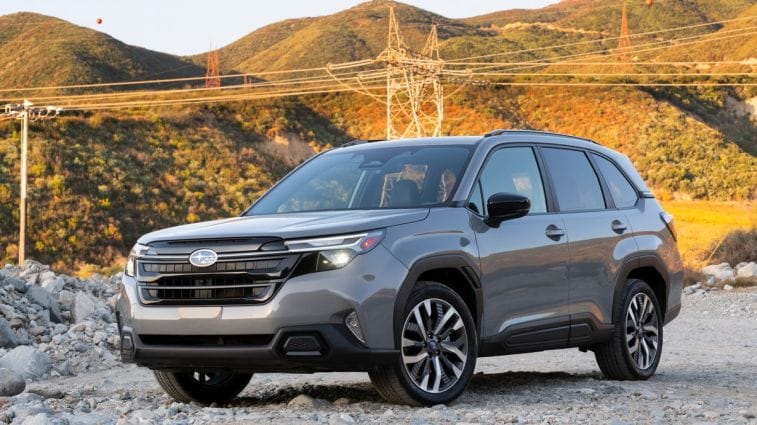The 2025 Mazda CX-50 and 2025 Subaru Forester are compact SUVs that impress with their agility, feature content, and standard all-wheel drive (AWD).
Introduced for the 2023 model year, the CX-50 sits in the middle of Mazda’s SUV lineup, above the smaller CX-30 and below the 3-row CX-90. There’s also a similarly sized CX-5 that’s more on-road oriented and the less-rugged brother to the CX-50.
The Subaru Forester occupies a similar middle-child role, sitting above the smaller Crosstrek but below the larger Outback and 3-row Ascent. It is all-new this year yet brings familiar Subie traits such as standard all-wheel drive, impressive ground clearance, and a rugged image.
Let’s see how the 2025 Mazda CX-50 and the 2025 Subaru Forester compare.
2025 Mazda CX-50

The Mazda CX-50 is available in seven trim levels and has a choice of powertrains. The four lower trims are equipped with a 187-horsepower 4-cylinder paired with a 6-speed automatic transmission. Beginning with the 2.5 Turbo, the CX-50 comes with a turbocharged version of this same 2.5-liter 4-cylinder. It makes 227 hp with 87-octane gasoline and 256 hp with 93-octane. It is also paired with a 6-speed automatic transmission. New this year is the 2025 Mazda CX-50 Hybrid, which we review separately.
For 2025, the Mazda CX-50 gains Amazon Alexa compatibility and enhanced safety features, including a rear seat alert and vehicle exit warning. The forward collision warning system now includes nighttime pedestrian detection.
Mazda CX-50 Highlights
Turbocharged engine: The standard 187-hp 4-cylinder will keep many Mazda customers happy, though the turbocharged engine gives the CX-50 a lot more pep. This punchier powertrain doesn’t detract much from the CX-50’s fuel economy, either. The base 4-cylinder returns an EPA-rated 27 mpg combined versus the 25 mpg combined from the turbo.
Mi-Drive: This driver-selectable system has various modes such as Normal, Sport, and Off-Road. It’s a handy feature for folks who plan to do some actual off-road driving in their Mazda. Sport mode ups the CX-50’s game with snappier acceleration and a firmer steering feel.
Sedan-like handling: The CX-50 is agile, and it feels more like a finely tuned sedan than a tall and heavy SUV. This is also true of the CX-5 and other Mazda SUVs, which are imbued with a fun-to-drive feel.
Check this week’s Fair Purchase Price or see the CX-50 models for sale near you.
2025 Subaru Forester

The venerable Subaru Forester has been revamped for the 2025 model year, bringing updated design, technology, and features as it enters its sixth generation. What remains is the Forester’s plucky, adventurous attitude. Like the CX-50, all-wheel drive comes standard on every Forester, in addition to off-road-oriented driving modes and hardware. The Forester is powered by a 2.5-liter 4-cylinder engine making 180 hp, linked to a continually variable automatic transmission (CVT). Also, like the CX-50, the 2025 Forester is available as a hybrid, which is reviewed separately.
Subaru Forester Highlights
Standard all-wheel drive: Sending power to all four wheels instead of just the front like most SUVs means enhanced traction. This extra traction and capability isn’t just handy for off-roading. If you regularly deal with snow or slick roads, all-wheel drive grants better handling and assurance.
EyeSight safety suite: Standard on every new Forester, this safety and driver assistance suite includes features like automatic emergency braking with pedestrian detection, lane departure alert, adaptive cruise control with lane centering, and a rear-seat reminder.
Cargo space: The Subaru Forester has long been loved for its ability to haul cargo, and this new generation carries on that trait. With the rear seats folded, the 2025 Forester has up to 74.4 cubic feet of cargo space, handily beating the Mazda’s max of 56.3 cubic feet.
Check this week’s Fair Purchase Price or see the Forester models for sale near you.
Similarities
The Mazda CX-50 and Subaru Forester have plenty in common, most notably similar power, standard AWD, and similar suites of active safety technology. Both also offer fuel-efficient hybrid variants.
Pricing
New 2025 MAZDA CX-50 Prices
|
Retail Price
|
Fair Purchase Price (92620)
|
|||
|---|---|---|---|---|
$31,920 |
$30,713 |
|||
$33,270 |
$31,693 |
|||
$35,620 |
$33,892 |
|||
$39,120 |
$37,539 |
|||
$42,420 |
$40,629 |
|||
$42,920 |
$41,186 |
|||
$44,920 |
$43,222 |
New 2025 Subaru Forester Prices
|
Retail Price
|
Fair Purchase Price (92620)
|
|||
|---|---|---|---|---|
$31,415 |
$29,473 |
|||
$33,730 |
$31,406 |
|||
$36,230 |
$33,722 |
|||
$36,415 |
$35,810 |
|||
$37,830 |
$35,435 |
|||
$41,715 |
$38,824 |
The Kelley Blue Book Fair Purchase Price for any individual used vehicle can vary greatly according to mileage, condition, location, and other factors. The prices here reflect what buyers are currently paying for New 2025 MAZDA CX-50 vehicles and New 2025 Subaru Forester vehicles in typical condition when purchasing from a dealership. These prices are updated weekly. The manufacturer’s suggested retail price (MSRP) quoted includes the destination fee, but does not include tax, license, document fees, and options.
Specifications
| 2025 Mazda CX-50 | 2025 Subaru Forester | |
| Popular Powertrains | ||
| Engine | 2.5-liter 4-cylinder | 2.5-liter 4-cylinder |
| Horsepower | 187 hp @ 6,000 rpm | 180 hp @ 5,800 rpm |
| Torque | 185 lb-ft @ 4,000 rpm | 178 lb-ft @ 3,700 rpm |
| Transmission | 6-speed automatic | CVT |
| Fuel economy | 24 mpg city/30 mpg highway/27 mpg combined | 26 mpg city/33 mpg highway/29 mpg combined |
| Also Available | Turbo 2.5-liter 4-cylinder | |
| Specs | ||
| Basic Warranty | 3 years/36,000 miles | 3 years/36,000 miles |
| Powertrain Warranty | 5 years/60,000 miles | 5 years/60,000 miles |
| NHTSA Overall Safety Rating | 5-Star | 5-Star |
| Max Seating Capacity | 5 | 5 |
| Wheelbase | 110.8 inches | 105.1 inches |
| Overall Length | 185.8 inches | 183.3 inches |
| Width | 75.6 inches | 72.0 inches |
| Height | 63.5 inches | 68.1 inches |
| Turning Diameter | 39.0 feet | 35.4 feet |
| Headroom, Front | 39.1 inches | 41.2 inches |
| Headroom, Rear | 38.6 inches | 39.6 inches |
| Legroom, Front | 41.7 inches | 43.3 inches |
| Legroom, Rear | 39.8 inches | 39.4 inches |
| Shoulder Room, Front | 55.9 inches | 57.7 inches |
| Shoulder Room, Rear | 53.6 inches | 56.7 inches |
| Cargo Volume (seats up/down) | 31.4/56.3 cubic feet | 29.6/74.4 cubic feet |
Conclusion
We love a close match, and this is definitely one of them that could go either way. Both of these models bring more adventurous attitudes and off-pavement capability than the average compact SUV, all while retaining the everyday practicality, safety, and technology that today’s buyers seek. If you want on-road manners that are on the fun and frisky side—and the option of a potent turbo engine—the Mazda might be calling your name in this comparison. If you want an even more rugged-feeling vehicle that can handle more cargo with the rear seats down, the Forester may be it. With two excellent choices here, this is a case where you really should drive them both to see which connects with you.







